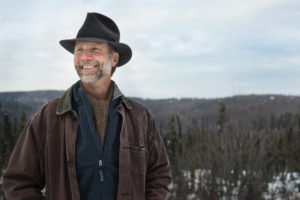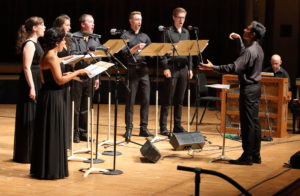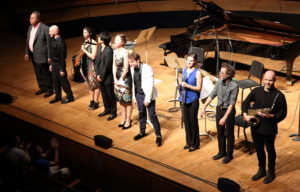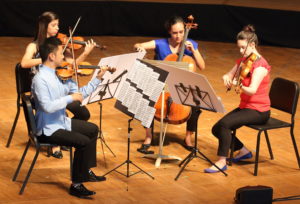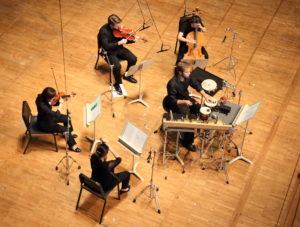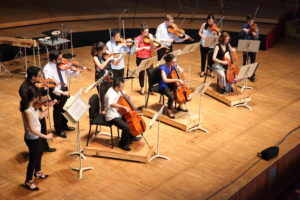Three works on the Proms in August raised issues of authorship and authenticity, among other things. Sir Edward Elgar in the last two years of his life was engaged in the composition of his Third Symphony, which had been encouraged by his friend George Bernard Shaw and commissioned by the BBC. When he died in February of 1934, he left 130 pages of sketches, mostly in short score with few indications of instrumentation, and for many years they were given little attention, and the work considered lost. Anthony Payne, a considerable composer himself, who has had a scholar’s interest in British music of that period, was engaged with the sketches for the Third Symphony starting in 1972, but only in 1993, when he did some work on realizing some of the work for a BBC workshop, did he engage seriously with the project of reconstructing the whole work. In 1996, after some initial resistance, and realizing that the sketches would come into public domain in 2005 anyway, the Elgar family, who controlled the copyright for the sketches, commissioned Payne to do a completion of the work. The completed work, (joining the rank of works such as the Mozart Requiem, completed, and with certain sections composed altogether by Süssmayr), officially called an elaboration, was first performed in 1998. The sketches gave hints of what Elgar’s intentions were for most of the work, but for the last movement, Payne had to more or less compose the bulk of it, and, for that matter, decide what its form was to be (“…I felt that the breadth of the expository material in the sketches pointed towards a sonata form.”). For this listener, the last movement is the least satisfying and, in fact, the least characteristically Elgarian. The orchestration in general seems a little less characteristic than one might expect. I thought at one point in the first movement, feeling that it was a little leaner than it should be, that it in a certain way was a parallel experience to hearing the 1947 version of Petrushka. As with other aspects, whether it might be characteristic of what Elgar might have himself done late in his career is anybody’s guess. In any case, the performance, by the BBC Symphony, conducted by Sakari Oramo, was committed and poetic and was certainly in high Elgarian style. The first half of that concert included Scènes historiques–Suite No. 1 by Sibelius and the Saint Saëns second piano concerto, with soloist Javier Perianes, both very well played, and both leaving me with a feeling that both of those composers were really good.
A different sort of reconstruction was represented by the late night Proms on August 15, presented by The Britten Sinfonia, Anoushka Shankar, Gaurav Mazumdar, Ameen Ali Khan, Nick Able, Ravichandra Kulur, Pirashanna Thevarajah, M. Balachandar, Sanjul Sahal, and Alexa Mason, conducted by Karen Kamensek. They played the first live performance of Passages, a collaboration between Ravi Shankar and Philip Glass from 1990. Recorded in a studio directly to disc, the work had never been given a live performance until this one. Each of the collaborators wrote three of the six tracks on the record, although who wrote which wasn’t specified, either on the album of in the program for this concert. The interview with Karen Kamensek quoted in the program speaks of large chunks of the Shankar movements having been re-barred to facilitate performance with a limited rehearsal schedule. The playing of this clearly rhythmically complex and sophisticated music was, all around, effortless and natural and enormously fluent and expressive. The content, to this listener, seemed negligible, if not non-existent.
The Prom on August 24 was focused on/dedicated to the music of Charles Mingus. It was presented by the Metropole Orkest, conducted by Jules Buckley, joined by Shabaka Hutchings, bass clarinet, Bart van Lier, trombone, Leo Pellegrino, baritone saxophone, Christian Scott, trumpet, and Kandace Springs, vocalist. Since jazz musicians are, as Gunther Schuller said, composing performers, the music even that the same players play will be different from performance to performance, and certainly from one performer, or one group of performers to another. So it is not surprising that the performances of Mingus’s works by a 56 piece orchestra, highly produced, mic’d and mixed, would have a different sound and texture and affect than the original recordings (which were certainly not the same as any other performance by the same performers) by Mingus and his, usually 5-7 associates. The end product of these very very fine players, I think, probably told us more about them and their very very fine playing than about Mingus’s music in any sort of faithful to the original way (achieved by the performance of the Glass/Shankar). In this case, of course, that wasn’t the aim. This is not to take anything away from the quality of the players involved or to disparage their playing in any way, but rather to state a perception, if not a fact. In any case, the playing was fine. It sounded beautiful and it swung. The program listed pieces by Mingus to be played in a certain order. At the beginning, Buckley, announced, very quickly and in an offhand manner that the order was going to be different. The program then proceeded without further commentary, so that if one didn’t know the specific Mingus pieces beforehand, and my guess is even if one did, it was difficult, if not impossible to tell which was which.
A fourth piece, Schoenberg’s Gurrelieder, which was performed on August 19 by Eva-Maria Westbroek (Tove), Simon O’Neil (Waldemar), Karen Cargil (Wood-Dove), Peter Hoare (Klaus the Fool), Christopher Purves (Peasant), and Thomas Quasthoff (spearker), with the CBSO Chorus, the London Symphony Chorus, Orfeó Català, and the London Symphony Chorus, conducted by Simon Rattle, might be included along with the other three, since, in a certain sense, the Schoenberg who conceived and began the work, in 1901, was not the same Schoenberg who took it up again in 1910 and finished it in 1911, due to the change in his outlook and in the style and character of the music he was writing. In any case the work’s excessiveness, its lusciousness of instrumental sound and harmony, the great craft of its composition, and its singlemindedness in pursuit of its composer’s vision are commonalities in the works of both those Schoenbergs. It is not all that often, due to the length, difficulty, and required forces, that one has a chance to hear Gurrelieder. Any performance of it creates what W. H. Auden called a high holy day of the soul. One as fine and devoted and beautiful as this one raises the level of that attribute even higher.
All of these concerts are available for 30 days after their broadcasts via the BBC Proms website.
